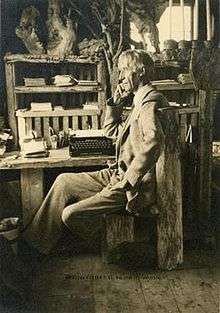Gerald Stanley Lee
Gerald Stanley Lee (1862-1944) was an American Congregational clergyman and the author of numerous books and essays. Lee was "a frequent contributor of reviews to the Critic and other periodicals and wrote books on religion, modern culture, and physical fitness."[1]
Lee was opposed to U.S. entry into World War I, writing essays and editorials characterizing the war as a clumsy effort of the nations involved to communicate their desires and one that could be settled without any U.S. intervention. This drew a harsh rebuke from G. K. Chesterton, who criticized Lee for imagining that the war then underway could be ended by mere discussion and for treating the warring forces as if they were on equal moral footing.[2]

Lee and his wife Jennette and daughter Geraldine summered on Monhegan Island, Maine, for over 30 years. He published a ten-cent magazine, Mount Tom, in Northampton, Massachusetts. A collection of his writings from this period is in the book Thoughts from a Driftwood Desk by P. Kent Royka.
Bibliography
- The Shadow Christ (1896)
- The Lost Art of Reading (1902)
- The Voice of the Machines (1906)
- The Child and the Book (1907)
- Inspired Millionaires (1908)
- Crowds: A Moving-Picture of Democracy (1913)
- We; A Confession of Faith for the American People During and After War (1916)
- The Air-Line to Liberty (1918)
- The Ghost in the White House (1920)
- Invisible Exercise; Seven Studies in Self Command With practical Suggestions and Drills (1922)
- Mount Tom (magazine) (1905-1917)
References
External links
| Wikiquote has quotations related to: Gerald Stanley Lee |
- Works by Gerald Stanley Lee at Project Gutenberg
- Works by or about Gerald Stanley Lee at Internet Archive
- Gerald Stanley Lee (1862-1944), Thoughts from A Driftwood Desk, Monhegan Island, Maine by P. Kent Royka